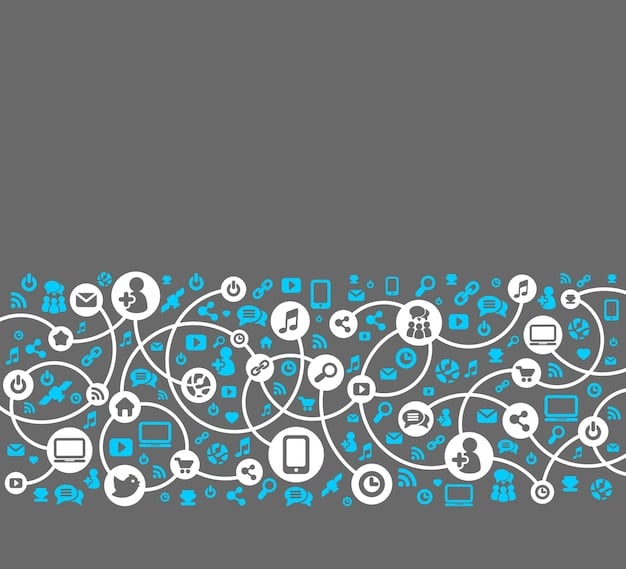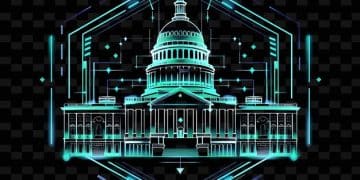Disinformation Warfare: How the US Fights Foreign Propaganda

Disinformation warfare is combated by the US through various strategies, including exposing and countering foreign propaganda, strengthening media literacy, and collaborating with international partners to promote accurate information and protect democratic institutions.
In today’s digital age, the spread of misinformation and disinformation poses a significant threat to national security and democratic processes. The US is actively engaged in disinformation warfare, employing various strategies to counter foreign propaganda and safeguard its citizens and institutions from manipulation.
Understanding Disinformation Warfare
Disinformation warfare involves the deliberate dissemination of false or misleading information to influence public opinion, destabilize political systems, or undermine national security. Foreign actors often employ these tactics to sow discord, manipulate elections, and erode trust in democratic institutions. The US has recognized the severity of this threat and is actively working to counter it.
Key Tactics Used in Disinformation Warfare
Foreign entities employ a range of tactics to spread disinformation, often leveraging social media and online platforms. Understanding these methods is crucial for effective defense.
- Creating Fake Accounts: Establishing bot networks and phony profiles to amplify false narratives.
- Spreading Conspiracy Theories: Promoting baseless claims to undermine trust in institutions.
- Using Deepfakes: Creating synthetic media to fabricate events and manipulate perceptions.
Combating these tactics requires a multi-faceted approach, including technological solutions, policy interventions, and public awareness campaigns.

The US government, along with various private organizations, is investing significant resources to detect and neutralize disinformation campaigns. By understanding the subtle nuances of these tactics, a more effective response can be implemented.
Government Initiatives to Counter Propaganda
The US government has implemented several initiatives to combat foreign propaganda and disinformation. These efforts involve various agencies and departments working in coordination to protect national interests and promote accurate information globally.
The Role of the State Department
The State Department plays a crucial role in exposing and countering foreign propaganda through its Global Engagement Center (GEC). The GEC identifies and analyzes disinformation trends, exposing the sources and tactics used by foreign actors.
In addition to exposing disinformation, the State Department also works to promote media literacy and support independent journalism around the world. These efforts aim to empower citizens to critically evaluate information and resist manipulation.
- Funding Independent Media: Supporting journalists and media outlets that provide unbiased reporting.
- Promoting Media Literacy: Educating the public on how to identify and resist disinformation.
- International Partnerships: Collaborating with foreign governments and organizations to counter propaganda.
By working on multiple fronts, the State Department aims to create a resilient information environment that is less susceptible to foreign manipulation.
Strengthening Media Literacy Among Citizens
One of the most effective ways to combat disinformation is to empower citizens with media literacy skills. When people can critically evaluate information, they are less likely to be swayed by false narratives and propaganda. Media literacy initiatives play a vital role in safeguarding democratic processes and promoting an informed citizenry.

These initiatives often target schools and community organizations, providing educational resources and training on topics such as source evaluation, fact-checking, and identifying bias. It is important for citizens to have tools to find trusted reporting.
Several non-profit organizations and educational institutions have developed comprehensive media literacy programs that are accessible to the public. These programs offer practical skills and resources that help individuals navigate the complex information landscape. Strengthening resilience to disinformation is key in the digital age.
Technological Solutions and AI in Disinformation Detection
Technological solutions, particularly artificial intelligence (AI), are playing an increasingly important role in detecting and countering disinformation. AI algorithms can analyze vast amounts of data to identify patterns, detect bot activity, and flag potentially false or misleading content. These technologies offer a scalable and efficient means of combating disinformation campaigns.
Using AI to Identify Bot Networks
AI algorithms can identify bot networks by analyzing patterns of activity, such as coordinated posting times, similar content, and fake profiles. These technologies can help platforms remove or flag inauthentic accounts, reducing the spread of disinformation.
While AI offers great potential, it is not a panacea. Disinformation actors are constantly evolving their tactics, so AI algorithms must be continuously updated and refined to stay ahead. Ensuring that AI is used ethically and transparently is another important consideration.
The ongoing advancements in AI technology promise to provide more sophisticated tools for detecting and combating disinformation, contributing to a more secure and trustworthy information environment.
The Role of Social Media Platforms
Social media platforms play a pivotal role in combating disinformation, given their reach and influence. These platforms have taken steps to identify and remove false content, flag misleading information, and promote media literacy among their users.
- Content Moderation: Removing or flagging false and misleading content.
- Partnering with Fact-Checkers: Collaborating with independent organizations to verify information.
- Promoting Media Literacy: Providing resources and tips to help users evaluate information critically.
However, progress has been uneven, and there is ongoing debate about how effectively these platforms are addressing the problem. Critics argue that social media companies need to be more proactive in identifying and removing disinformation, while also protecting free speech and avoiding censorship.
International Cooperation and Alliances
Combating disinformation requires a global effort, as foreign propaganda often transcends national borders. International cooperation and alliances are essential for sharing information, coordinating strategies, and building resilience to disinformation campaigns.
Sharing Intelligence and Best Practices
Many countries have established partnerships to share intelligence on disinformation trends and tactics. This intelligence sharing enables coordinated responses and helps to identify and neutralize foreign propaganda campaigns more effectively.
International organizations, such as the European Union and NATO, also play a key role in coordinating efforts to counter disinformation. These organizations provide platforms for member states to share best practices, develop common strategies, and conduct joint exercises.
International cooperation is indispensable for creating a unified front against disinformation, safeguarding democratic processes, and promoting a more secure and trustworthy information environment.
Addressing Future Challenges in Disinformation Warfare
Disinformation warfare is a constantly evolving threat, and new challenges are emerging all the time. Addressing these challenges requires ongoing innovation, adaptation, and collaboration among governments, technology companies, and civil society organizations.
Emerging Technologies and Tactics
The rise of new technologies, such as deepfakes and AI-generated content, poses a significant challenge for combating disinformation. These technologies can be used to create highly realistic fake videos or audio recordings that are difficult to distinguish from reality.
Disinformation actors are also becoming more sophisticated in their tactics, using psychological profiling, microtargeting, and other techniques to reach specific audiences with tailored messages. Understanding these emerging threats and developing effective countermeasures is vital for protecting national security and democratic processes.
By anticipating future challenges and investing in research and development, the US can stay ahead of disinformation actors and maintain its strategic advantage in the information environment.
| Key Point | Brief Description |
|---|---|
| 🛡️ Government Initiatives | US government agencies actively combat foreign propaganda. |
| 📚 Media Literacy | Empowering citizens with critical evaluation skills. |
| 🤖 AI Detection | Using AI to identify and flag disinformation. |
| 🤝 International Cooperation | Global alliances sharing strategies against propaganda. |
FAQ
▼
Disinformation warfare is the deliberate spread of false information to manipulate public and political systems, often initiated by foreign entities to undermine trust and create division.
▼
The US combats foreign propaganda through government initiatives, media literacy programs, technological solutions like AI for detection, and international cooperation for comprehensive strategies.
▼
Social media platforms play a significant role through content moderation, partnerships with fact-checkers, and promoting media literacy to combat the spread of false information among users.
▼
Emerging challenges include AI-generated deepfakes used for misinformation, sophisticated microtargeting tactics to influence specific demographics, and the rapid evolution of tactics by disinformation actors.
▼
International cooperation is crucial as disinformation often crosses borders, thus requiring coordinated efforts to share intelligence and best practices, which builds a unified front against global propaganda threats.
Conclusion
In conclusion, the US is actively engaged in combating disinformation warfare through a variety of strategies, including exposing foreign propaganda, strengthening media literacy, leveraging technological solutions, partnering with social media platforms, fostering international cooperation, and addressing future challenges. These multifaceted efforts are essential for safeguarding national security, protecting democratic processes, and promoting an informed citizenry in an increasingly complex information environment.





